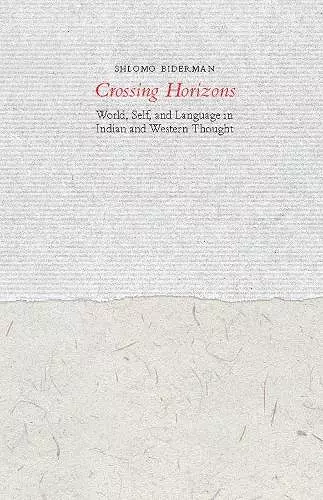Crossing Horizons
World, Self, and Language in Indian and Western Thought
Shlomo Biderman author Ornan Rotem translator
Format:Hardback
Publisher:Columbia University Press
Published:29th Feb '08
Currently unavailable, and unfortunately no date known when it will be back

This book will make a significant contribution to the nascent but growing literature in comparative philosophy that focuses on basic human questions while continuing to observe philosophical rigor. -- Laurie L. Patton, professor of early Indian religions and chair, Department of Religion, Emory University Upon reading this book, I was struck from the very beginning by the originality of Shlomo Biderman's approach, the breadth and profundity of his scholarship, and the sophistication of his judgments. While fully appreciating what is right in criticisms of the older, 'Orientalist,' style of comparative philosophy, Biderman brilliantly points out the ways in which currently trendy postmodernist writers frequently fall into formulations that are just as oversimplified and inadequate as those of their modernist and Victorian predecessors. The value of Biderman's conception of comparative philosophy lies precisely in making evident our own cultural assumptions--which have been accepted by almost every Western philosopher from Parmenides to the present day. -- Hilary Putnam, Cogan University Professor of Philosophy, emeritus, Harvard University
Examines the views, outlooks, and attitudes of two distinct cultures: the West and classical India. The author looks at a varied collection of primary sources: the "Rig Veda", the "Upanishads", and texts by the Buddhist philosophers Nagarjuna and Vasubandhu, among others.In this book, Shlomo Biderman examines the views, outlooks, and attitudes of two distinct cultures: the West and classical India. He turns to a rich and varied collection of primary sources: the Rg Veda, the Upanishads, and texts by the Buddhist philosophers Nagarjuna and Vasubandhu, among others. In studying the West, Biderman considers the Bible and its commentaries, the writings of such philosophers as Plato, Descartes, Berkeley, Kant, and Derrida, and the literature of Kafka, Melville, and Orwell. Additional sources are Mozart's Don Giovanni and seminal films like Ingmar Bergman's Persona. Biderman uses concrete examples from religion and literature to illustrate the formal aspects of the philosophical problems of transcendence, language, selfhood, and the external world and then demonstrates their plausibility in actual situations. Though his method of analysis is comparative, Biderman does not adopt the disinterested stance of an "ideal" spectator. Rather, Biderman approaches ancient Indian thought and culture from a Western philosophical standpoint to uncover cultural presuppositions that can be difficult to expose from within the culture in question. The result is a fascinating landmark in the study of Indian and Western thought. Through his comparative prism, Biderman explores the most basic ideas underlying human culture, and his investigation not only sheds light on India's philosophical traditions but also facilitates a deeper understanding of our own.
ISBN: 9780231140249
Dimensions: unknown
Weight: unknown
368 pages